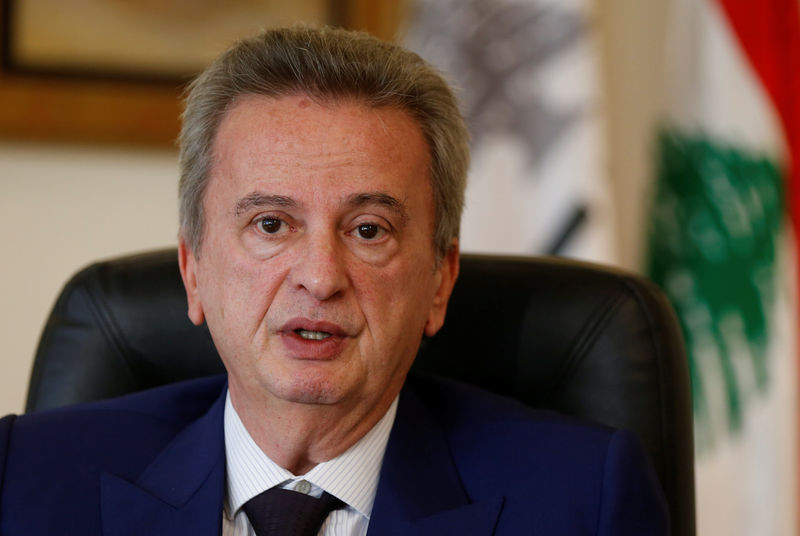 © Reuters. Lebanon’s Central Bank Governor Riad Salameh speaks during an interview with Reuters in Beirut
© Reuters. Lebanon’s Central Bank Governor Riad Salameh speaks during an interview with Reuters in BeirutBy Lisa Barrington
BEIRUT (Reuters) – IMF criticism of Lebanon’s public finances is valid, but the country’s draft 2018 budget sends a good signal as it seeks to cut one of the world’s highest debt-to-GDP ratios from above 150 percent, the head of its central bank said.
Riad Salameh also said in an interview with Reuters on Friday that economic growth could be boosted by 1 percentage point for every $1 billion of donor funding that the government secures and spends.
To help stimulate its battered economy, Lebanon is seeking up to $16 billion for infrastructure investment from investors and donors who hope to ward off more Middle East instability, in a country that hosts more than 1 million Syrian refugees.
Growth and state revenues have been low for years, undermined by war in neighboring Syria and domestic political inertia.
The central bank is due to publish its official 2018 growth outlook in July, and Salameh said a rate of between 2.5 and 3 percent was a “conservative” target.
That excluded the potential impact of the $16 billion capital investment plan, for which fundraising will begin with an April 9 donor conference in Paris.
“If we start seeing projects being executed … we can estimate that for every $1 billion spent we can increase growth by 1 percent,” Salameh said.
The International Monetary Fund, which expects 2017-2018 growth of around 1-1.5 percent, said last month that Lebanon’s debt trajectory was unsustainable and fiscal and structural reforms were urgently needed.
Salameh described the IMF report as “realistic”.
UNDER PRESSURE
Lebanon’s parliament is under pressure to approve the budget before the Paris conference, which it is expected to do.
The draft, with a deficit matching last year’s at 7.3 trillion Lebanese pounds ($4.8 billion), demonstrated a “serious effort” to address concerns and sent “a good signal to the markets,” Salameh said.
The gap could be cut further with the help of structural reforms, but these were unlikely until after parliamentary elections on May 6.
On Thursday Lebanon agreed its first two deals with the European Bank for Reconstruction and Development, which focuses on private sector-led development.
Salameh said the government’s embrace of the private sector was a positive turn and “a good sign for the creation of employment and decreasing corruption”.
“We consider it a major reform in a trend where the size of the government in the economy has been increasing year on year.”
With growth low, Lebanon relies on deposit inflows to local banks from its large diaspora to fund the government and maintain central bank defenses.
STEPPING BACK?
In the absence of effective political leadership, the central bank has for years quietly steered policy, using stimulus packages and what the IMF termed “unconventional” financial engineering to keep foreign reserves stable and growth ticking over.
This year, with the likely passing of the budget, a growing political consensus on reform and a date set for the country’s first parliamentary elections since 2009, Salmeh said the central bank hoped to scale back its role.
“We aim at reducing the size of our balance sheet by reducing our involvement in non-conventional activities as a central bank.”
He said the central bank planned no new financial operations to raise reserves, which briefly fell in November during a political crisis when the prime minister offered his resignation in a broadcast from Saudi Arabia, straining the Lebanese pound’s peg to the dollar and causing some financial outflows.
Salameh said Lebanon had “recovered and exceeded” what it lost then, with foreign assets excluding gold at more than $43 billion.
“Confidence in the financial sector of Lebanon remains solid,” he said, noting that the draft budget contained a provision for the central bank to exchange Lebanese pounds for government-issued eurobonds.
The November political crisis caused local currency interest rates to rise by around 2 percentage points.
Salameh said he did not intend to change rates for the time being as there was equilibrium in the market, but that could change.
There were challenges related to regional stability “and how to meet higher interest rates that are starting to happen worldwide and higher oil prices, as Lebanon is an importer of oil,” he said.
Source: Investing.com



























